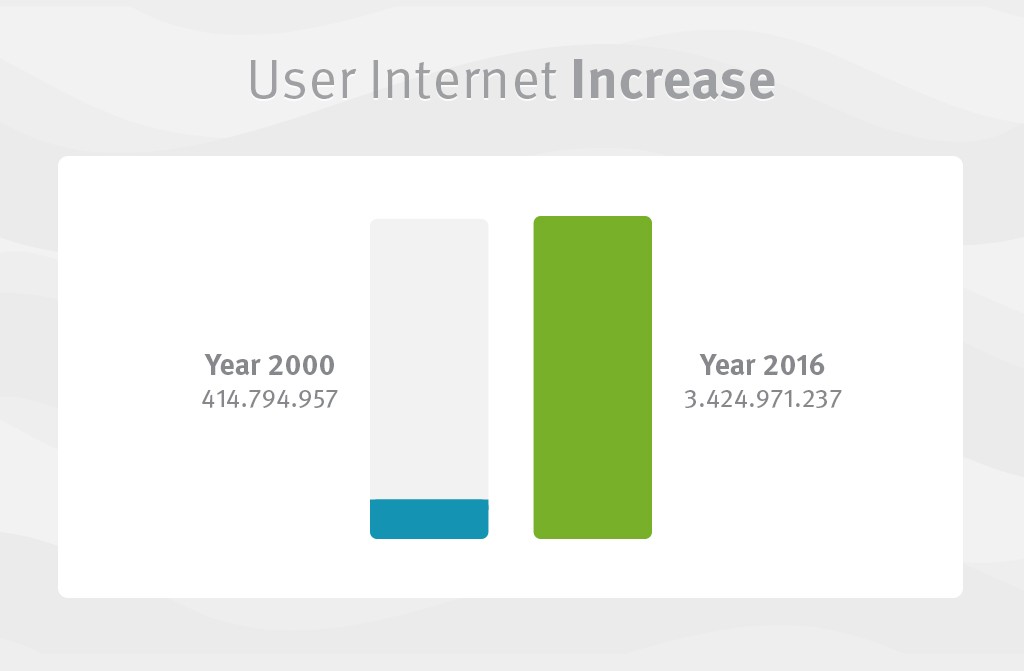The internet, by its own nature, has allowed millions of people to connect worldwide. Just think that 40% of the world population uses the internet everyday. Online knowledge and information sharing has become crucial for human development. Having information available in your native language will to an extent determine how involved you can be with the online world. That’s why encouraging multilingualism and cultural diversity in WordPress should be at the top of our list.

Everyone, should therefore be able to have access to a multilingual internet, and in turn to a multilingual WordPress. As WordPress is on the rise, with approximately 1 in 4 websites being run on WordPress, increasing multilingualism in WordPress can have a huge overall effect on the online cultural diversity worldwide. Here is an approximation of how internet users have increased since the year 2000.

With over 3 billion daily internet users, you can only imagine how many languages are spoken online. So, how many are being catered for? UNESCO (United Nations Educational, Scientific and Cultural Organization) talk about linguistic diversity and they have concluded that,
Many languages are not present on the Internet. There is a vast linguistic divide, which exists in cyberspace today and this will only exacerbate the digital divide.
How is WordPress making a difference?
WordPress Polyglots Team
First and foremost, WordPress has a Polyglots team. This is a dedicated WordPress translation team that works on translating all aspects of WordPress into as many languages as possible. There have been 162 locales released up to now, and they are working on getting more translations. This is a global localization project that just about anyone can get involved in. If you are willing, and you have some spare time to translate into your native language, you could become a part of this incredible team. There are weekly chats with all team members, you can ask questions, consult on translations and meet like minded people. Most importantly you could contribute to something bigger, your translation can help someone start a business, learn new key information, meet a friend or simply feel at home online.
I caught up with Luis Rull, WordPress General Translation Editor (GTE) at #es_ES team and asked him about his involvement with the Polyglots team.
“I chose to help in the translation team because it was the most productive way of helping the community. Since I don’t know how to code, translating and organizing events were my best options.”
I also found out that the Polyglots team is always on the lookout for more help. There is an ongoing demand for translations, which simply shows the need for a more multilingual WordPress. Luis tells me.
“The biggest challenge right now is to be more efficient in translating themes and plugins. The amount of work is huge and we find it difficult to encourage the community to do work which can at times be very tedious.”
If we can have 1 in 4 websites be adapted and localized to as many languages as possible, imagine the opportunities we can create for those whose first language isn’t English. For now the Polyglots team is covering WordPress core, bundled themes, plugins and more, but with new translators joining everyday more languages and areas of WordPress can be covered. If you are thinking about it, have a look at the details here.
WordPress Multilingual Plugins
The core translations are essential, but translating your own website into more than one language is something that is often required. You might be working with people from different areas, or you want to reach someone who doesn’t speak your language, but you want to approach them in their own. WordPress apart from being the most widespread CMS out there, has dedicated plugin authors who have brought their attention to languages.
One of these is WPML, it helps you build multilingual websites easily, so that you can provide a feel at home experience for all of your users, by speaking their language. I spoke to Amir Helzer, founder and CEO at OnTheGoSystems, the people behind WPML.
We see the need for multilingual websites for different reasons. Some countries, like Canada and Switzerland are multilingual, by definition. Many companies and organizations need multilingual sites in order to connect with their audience from all over the world.
There is, as it seems, an ongoing need for language diversity. Although, English is dominating the internet, with around 1.8 billion people speaking it, there is still at least the same amount of people that don’t. Amir tells me more about what WPML is trying to achieve.
“WPML’s mission is to make building multilingual sites easy. Many of our clients use teams of translators and require advanced translation workflows. WPML provides this using our Translation Management module. Other clients need to translate themselves. For them, WPML’s Translation Editor gives a simple and efficient solution.”
Often there seem to be lots of obstacles to getting your online presence and websites to turn multilingual, and WPML takes away all of the hassle. It allows laymen to be able to provide multilingual services, and cater to the full 3 billion people that are surfing the internet everyday.
Another important aspect to mention, is WPML’s compatibility. Amir explains.
“Besides a complete translation workflow, WPML also focuses on compatibility. We are proud to be compatible with over 90% of the installed themes and plugins for WordPress. Other authors are usually happy to work with WPML team, as compatibility with WPML also implies good use of WordPress standards and high code quality.”
WPML plugin highlights that there are ways to address a multilingual audience, and it doesn’t have to be as complicated as it might seem at the sight.
Wrapping Up/ Der Abschluss/ եզրափակում
This article has barely scratched the surface in discussing multilingualism, and I have given you two examples of how WordPress is doing its part in helping increase online language diversity. If you are a polyglot, there are plenty of ways you can share your knowledge and help make the internet more multilingual. You just need to pick a place to start.

Idoia
I do agree; it’d be great to be able to use the tools in a multilingual mode (in Spanish, e.g.), but, most of all, it’d be very useful if we all could personalize translating our reports just in order to make them useful for our partners or clients. I’ve just begun using this great tool, thank you very much!
Nevena Tomovic
Hey Idoia,
Stay tuned that’s on our roadmap! It’s coming soon.
Aron
As someone living in Switzerland I fully agree with the importance of multilingualism and multilingual websites.
WordPress offers many useful tools for a multilingual website, but keeping up with translations is still a huge work, even for a small website/blog…
Since I discovered ManageWP I gained some more time that I can invest in updating my websites and making them multilingual, which is a good thing. But unfortunately ManageWP does not have any polyglot superpowers until now… 🙁
Is it planned that ManageWP will start supporting more languages in the future? Unfortunately sending a report in English to an German/French/Italian-Speaking customer is not ideal, therefore the possibility to send them in multiple languages would be really appreciated.
Nevena Tomovic
I agree entirely Aron.
We are indeed planning on making ManageWP more multilingual, especially because we are a very multilingual team. It’s on our to do list, but it will take some more planning and execution time.
Stay tuned, and all suggestions are welcome.
Thanks,
Nevena